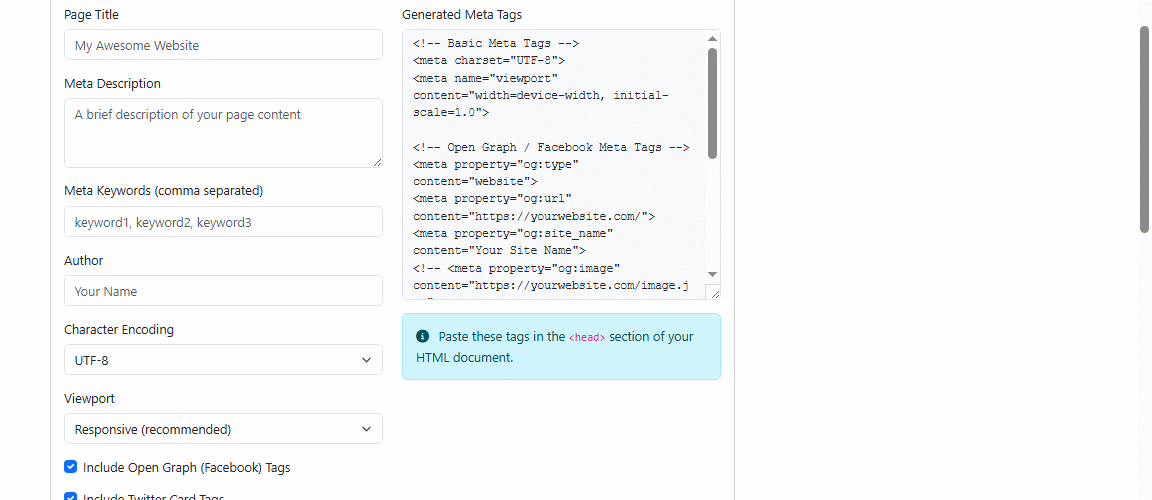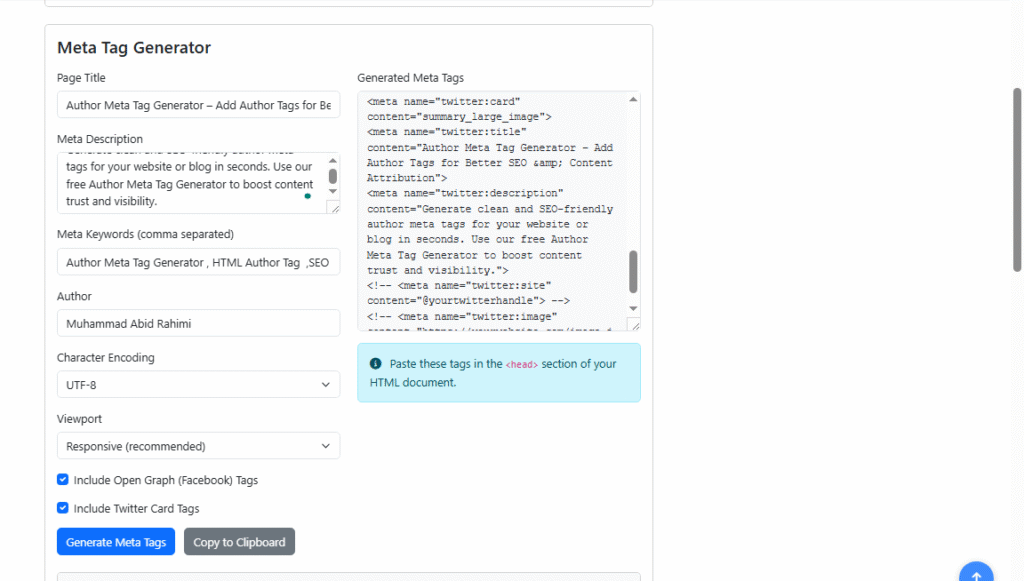Author Meta Tag Generator – Add Author Tags for Better SEO & Content Attribution

In today’s SEO-driven world, search engines care not just about what’s being said, but also who is saying it. As content authenticity and trust become increasingly important, adding proper author meta tags to your HTML can make a measurable impact.
In this guide, we’ll cover everything you need to know about author meta tags, their role in SEO, and how you can use the Author Meta Tag Generator tool to create them effortlessly.
What Is an Author Meta Tag?
The author meta tag is an HTML meta element that identifies the creator or writer of a web page or blog post.
Here’s what it looks like in code:
htmlCopyEdit<meta name="author" content="John Doe">
This tag doesn’t appear on the webpage itself but sits in the HTML <head> section, signaling to search engines and browsers who wrote the content.
Table of Contents
Why Use Author Meta Tags?
You might ask—if it’s not visible to users, why does it matter?
Here are a few benefits:
- ✅ Credibility & Transparency: Shows there’s a real human behind the content.
- ✅ Improved SEO Signals: Google values E-E-A-T (Experience, Expertise, Authoritativeness, and Trust).
- ✅ Knowledge Graph Boost: Helps build connections between content and author profiles.
- ✅ Browser & Tool Support: Some developer tools or platforms display author data.
- ✅ Content Ownership: Helps track and protect content ownership across web apps.

What Is the Format of an Author Meta Tag?
The most basic format is:
htmlCopyEdit<meta name="author" content="Jane Smith">
But if you’re using structured metadata, you might also add schema.org or Open Graph author properties (though those are technically separate from the meta tag format).
Introducing the Author Meta Tag Generator Tool
Manually writing author tags for hundreds of posts? That’s tedious, time-consuming, and prone to typos. Our Author Meta Tag Generator Tool makes it simple.
Features:
- Input your author name
- Auto-generate HTML meta tag
- Copy-friendly format
- No registration required
- Mobile-friendly interface
- Works for blogs, websites, CMS pages, and more
How It Works:
- Open the tool
- Enter the author’s full name
- Click Generate
- Copy the resulting HTML tag
- Paste it into the
<head>section of your HTML file or template
That’s it—fast, clean, and SEO-friendly.
Sample Use Case: Blogger
Suppose you’re running a personal blog with 100+ posts. Manually editing every post’s HTML header to insert author meta tags would take hours.
With the tool, you can:
- Enter your name: Ali Raza
- Click Generate
- Copy-paste the tag to all post templates
- Done in minutes!
Does the Author Meta Tag Impact SEO Directly?
Google has stated that it does not rely solely on the meta name="author" tag for rankings. However, it does consider author information when evaluating trustworthiness, especially for YMYL (Your Money or Your Life) topics—like health, finance, and legal advice.
So while it’s not a direct ranking factor, it’s an important supporting signal.
Additionally:
- Platforms like Bing and DuckDuckGo do use meta tags more visibly.
- Browser extensions and site audit tools (like Ahrefs or SEMrush) report missing author tags as SEO issues.
What If I Don’t Use It?
If you skip the author tag:
- Your content might appear anonymous
- You miss out on authorship-based trust
- Readers and crawlers have no metadata to attribute the content
Think of it as a digital signature for your writing.
Best Practices for Author Tags
- ✅ Use full names: Avoid usernames like “admin” or “user123”.
- ✅ Keep it consistent: Use the same spelling across all posts.
- ✅ Combine with structured data: Add author markup using JSON-LD.
- ✅ Use organization name when relevant: For company blog posts.
- ✅ Avoid keyword stuffing: The tag is not for SEO tricks.
Is It Secure to Display Author Names in Meta?
Yes. The author meta tag does not expose sensitive data, emails, or contact info. It’s simply a name value for attribution.
That said, do not confuse it with:
htmlCopyEdit<meta name="reply-to" content="email@example.com">
Which can expose email addresses and invite spam.
Combine Author Tag with Schema Markup
For advanced SEO, use author info inside structured data:
htmlCopyEdit<script type="application/ld+json">
{
"@context": "https://schema.org",
"@type": "Article",
"author": {
"@type": "Person",
"name": "Jane Doe"
}
}
</script>
This reinforces the author identity and helps Google display enhanced features like author knowledge panels.
Real-Life Applications
Here’s how professionals use the tool:
| Role | Use Case |
|---|---|
| SEO Expert | Add authorship tags for hundreds of blog URLs |
| Web Developer | Automate author tag insertion via templates |
| Blogger | Quickly create tags for guest posts |
| Agency | Add client writer credits at scale |
Download & Embed Option
This tool can be embedded on your blog or CMS backend. Simply:
- Download the HTML snippet
- Include it in your custom dashboard
- Let contributors auto-generate author tags
Want a JavaScript version? I can build it for you.
Reusability Across CMS Platforms
✅ WordPress
✅ Blogger
✅ Ghost
✅ Jekyll
✅ Hugo
✅ Custom PHP or HTML pages
Paste the generated meta tag inside:
htmlCopyEdit<head>
<!-- other meta tags -->
<meta name="author" content="Your Name">
</head>
Why Google’s E-E-A-T Framework Makes Author Tags Essential
Google emphasizes Experience, Expertise, Authoritativeness, and Trustworthiness (E-E-A-T). Author information supports:
- Expertise: Who wrote this? Are they qualified?
- Authority: Is this author recognized in their field?
- Trust: Is this article reliable?
Adding author tags won’t guarantee a top ranking, but omitting them can be seen as a lack of transparency.
Conclusion: Why You Should Use the Author Meta Tag Generator
If you’re publishing quality content but skipping basic author meta data, you’re leaving trust, credibility, and SEO equity on the table.
With our free Author Meta Tag Generator, you can:
- Instantly generate clean HTML tags
- Attribute your content properly
- Improve site metadata hygiene
- Strengthen SEO trust signals
- Build an author identity across search engines
Try the Tool Now
👉 Launch Author Meta Tag Generator Tool
No sign-up. No coding needed.
Just enter your name → copy → paste → publish.




